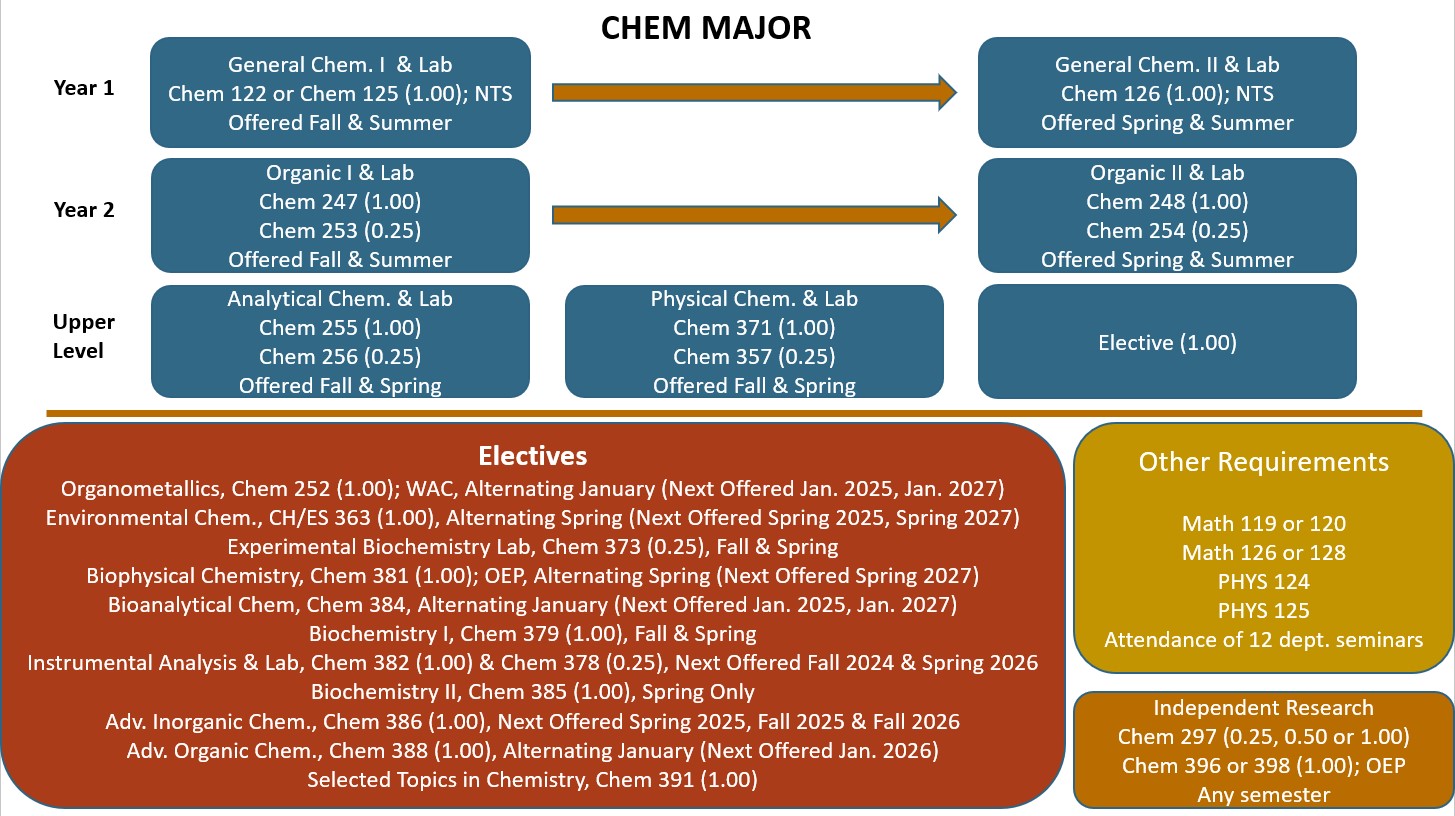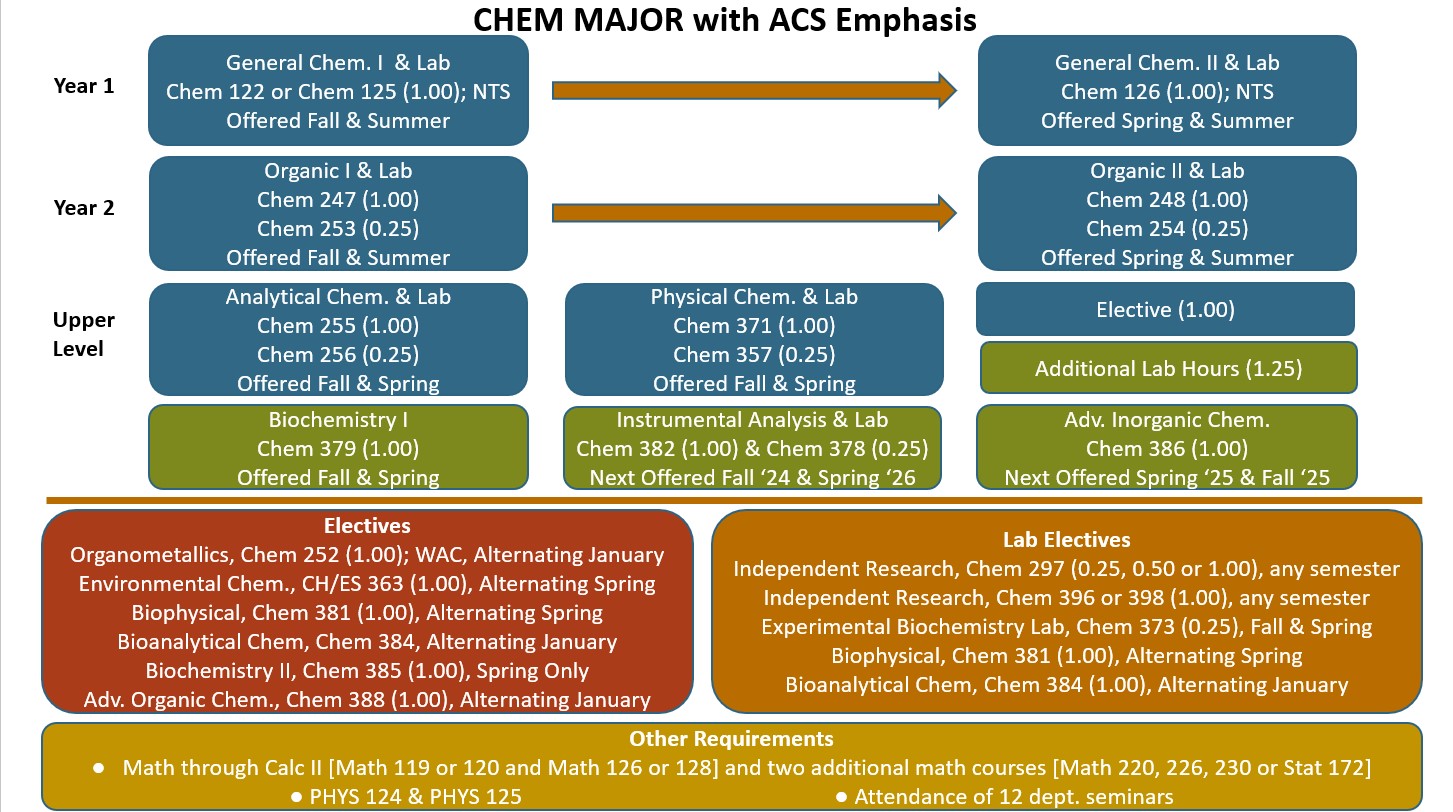Chemistry Major: St. Olaf College offers a chemistry major with the opportunity to pursue an American Chemical Society (ACS) emphasis. The first diagram below describes the general structure of the major, and represents the minimum sequence of courses used to earn a chemistry major at St. Olaf College. In addition to courses within the chemistry department the major requires attendance at chemistry department seminars, and it engages courses in other departments (e.g., math and physics). A majority of chemistry majors choose to complete more than the minimum major, taking extra courses in the area(s) that most interest them. Some of these students choose to declare an ACS emphasis.
ACS Emphasis: As a program approved by the Committee on Professional Training of the American Chemical Society (ACS), the St. Olaf College Chemistry Department may award ACS-certified degrees. Students can earn an ACS-certified degree if they complete the chemistry major with the American Chemical Society emphasis. This optional emphasis provides a path for students to complete a more rigorous and encompassing chemistry training. The ACS emphasis signifies to employers and graduate programs that these individuals have chemical knowledge and skills above the standard major. We encourage graduate school bound students to work with their advisor and other chemistry faculty to determine the best choices for their situation. Chemistry courses taken for the ACS emphasis count towards the elective course for the chemistry major.
Chemistry Major

| Course/lab No. | Required (●) Electives (𐩒) | Course Title | |
|---|---|---|---|
| 122 or 125 | ● | Introductory Chemistry (1.0) or Structural Chemistry & Equilibrium (1.0) | |
| 126 | ● | Energies and Rates of Chemical Reactions (1.0) | |
| 247(253) & 248(254) | ● | Organic Chemistry & Synthesis Laboratories (2.5) | |
| 255(256) | ● | Analytical Chemistry & A-Chem Lab (1.25) | |
| 371(357) | ● | Physical Chemistry & P-Chem Lab (1.25) | |
| Phys 124 & 125 | ● | Alternatively you may choose Phys 130, 131, and 232 | |
| Math through Calc II | ● | Choose from: Math 119 (Calc I with Review) or Math 120 (Calc I) AND Math 126 (Calc II) or Math 128 (Honor’s Calc II), or high school equivalent on your St. Olaf degree audit. Consult mathematics placement survey recommendation. | |
| Attend 12 department seminars | ● | Seminars count as soon as the chemistry major is declared. Fill out and turn in attendance cards. See your attendance totals under “Grades” in the Moodle course called “Chemistry Major.” | |
| 252a | 𐩒 | Organometallic Chemistry (1.0) | |
| 298b | 𐩒 | Independent Study (1.0) | |
| CH/ES 363c | 𐩒 | Environmental Chemistry (1.0) | |
| 379 | 𐩒 | Biochemistry (1.0) | |
| 381c,d | 𐩒 | Biophysical Chemistry (1.0) | |
| 382 (378) | 𐩒 | Instrumental Analysis and Lab (1.25) | |
| 384a,d | 𐩒 | Bioanalytical Chemistry (1.0) | |
| 385d | 𐩒 | Biochemistry II (1.0) | |
| 386 | 𐩒 | Advanced Inorganic Chemistry (1.0) | |
| 388a | 𐩒 | Advanced Organic Chemistry (1.0) | |
| 391d,e | 𐩒 | Selected Topics in Chemistry (1.0) | |
| 297f | Independent Research (0.25, 0.5, 1.0) | ||
| 373d | Experimental Biochemistry (0.25) | ||
| 396 | Directed Undergraduate Research (1.0) | ||
| 398b | Independent Research (1.0) |
In addition to the required courses, students must choose at least 1 credit from the electives.
a Chem 252 (Organometallic Chemistry), Chem 384 (Bioanalytical Chemistry), and Chem 388 (Advanced Organic Chemistry) are January courses. Chem 388 is planned for even numbered years. Chem 252 and 384 are planned for odd numbered years.
bA form for Chem 298 or 398 registration is available from the Registrar.
cCH/ES 363 (Environmental Chemistry) is offered in the spring term of even numbered calendar years. Chem 381 (Biophysical Chemistry) is offered on a rotating basis – see current class and lab schedule for its availability.
d Chem 373 is required for the Biomolecular Science (BMols) concentration; Chem 381, 384, 385, 391 (depending on topic, check with BMols Director may count as electives toward the Biomolecular Science concentration.
e See current class and lab schedule for the availability of Chemistry 391. Consult Chemistry faculty if you have questions.
f Register for Chem 297 via an email with the professor to registrar@stolaf.edu. These courses are P/N only.
Chemistry Major with ACS Emphasis

| Required courses | ||
|---|---|---|
| 379 | Biochemistry I | 1 |
| 382(378) | Instrumental Analysis and Instrumental Analysis Laboratory | 1.25 |
| 386 | Advanced Inorganic Chemistry | 1 |
| Select one course from the following electives (1.0 credit): | ||
| 252 | Organometallic Chemistry | 1 |
| 298 | Independent Studyb | 1 |
| CH/ES 363 | Environmental Chemistry | 1 |
| 381 | Biophysical Chemistry | 1 |
| 384 | Bioanalytical Chemistry | 1 |
| 385 | Biochemistry II | 1 |
| 388 | Advanced Organic Chemistry | 1 |
| 391 | Selected Topics in Chemistry | 1 |
| Additional laboratory hours. Choose 1.25 credits from the following: | ||
| 297 | Independent Research (0.25, 0.50, 1.00)c | 1 |
| 373 | Experimental Biochemistry Lab | 0.25 |
| 381 | Biophysical Chemistry | 1 |
| 384 | Bioanalytical Chemistry | 1 |
| 396 | Directed Undergraduate Researchc | 1 |
| 398 | Independent Researchc | 1 |
| Summer researchc | 1 | |
| Additional mathematics. Choose two courses from the following: | ||
| MATH 220 | Elementary Linear Algebra | 1 |
| MATH 226 | Multivariable Calculus | 1 |
| MATH 230 | Differential Equations I | 1 |
| STAT 172 | Statistics I | 1 |
a Some courses will double or triple count toward various requirements. For instance, bioanalytical chemistry (384) counts as the additional elective course, the 1.0 credit toward the laboratory requirement and satisfies the laboratory experience on a biochemistry or inorganic topic for the ACS emphasis. A summer research on a biochemistry or inorganic project counts for 1.0 out of the 1.25 credits for the additional laboratory hours and satisfies the laboratory experience on a biochemistry or inorganic topic for the ACS emphasis.
b Project for Chem 298 must have departmental approval.
c Summer research can substitute for 1.00 credit worth of lab experiences. In order for more than 0.25 credit of research to be used to fulfill this requirement, a comprehensive written report must be submitted. One laboratory experience must include either biochemistry or inorganic topics. Research can be used to fulfill this biochemistry or inorganic topic requirement, pending approval from the chair of the chemistry department.
You must be logged in to post a comment.